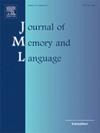The big five traits openness and conscientiousness affect the memory of alcohol-intoxicated eyewitnesses
IF 3
1区 心理学
Q1 LINGUISTICS
引用次数: 0
Abstract
This novel study was the first to examine how alcohol and personality affect witnesses’ memory. Using a quasi-experimental method, participants (N = 65) recruited from local bars provided breath alcohol concentration measurements and personality ratings using Big Five (i.e., Openness, Conscientiousness, Extraversion, Agreeableness, Neuroticism). Participants viewed a filmed witness event, followed by an interview about the event. BAC ranged from 0.00-0.14 %, with a mean of 0.05 % (SD = 0.03 %). Results showed that there was a significant effect of Openness on the quantity of witness recall, with higher Openness scores yielding a greater number of witness details recalled. Also, participants with increased intoxication levels in combination with higher Conscientiousness scores reported fewer details. Finally, increased alcohol-intoxication had a negative effect on memory as witnesses’ accuracy rate declined, while their number of “I do not know” answers increased. Our findings suggest that personality differences may play an important role in alcohol-intoxicated witnesses’ episodic long-term memory, despite being largely neglected by researchers. Future research is encouraged to continue disentangle the complexity of the interaction between personality, alcohol, and witness memory.
五大特质中的开放性和自觉性会影响酒醉目击者的记忆力
这项新颖的研究首次探讨了酒精和人格如何影响证人的记忆。通过准实验方法,从当地酒吧招募的参与者(N = 65)提供了呼气酒精浓度测量结果,并使用大五人格(即开放性、自觉性、外向性、宜人性和神经质)对其人格进行评分。参与者观看了一段目击事件的录像,随后就该事件进行了访谈。酒精浓度范围为 0.00-0.14%,平均值为 0.05%(标准差 = 0.03%)。结果显示,开放度对证人回忆的数量有显著影响,开放度得分越高,回忆的证人细节数量越多。此外,醉酒程度越高的参与者,其认真度得分越高,其报告的细节越少。最后,酒精中毒程度的增加会对记忆产生负面影响,因为证人的准确率会下降,而他们回答 "我不知道 "的次数会增加。我们的研究结果表明,人格差异可能在酒精中毒证人的外显长期记忆中扮演重要角色,尽管这一点在很大程度上被研究人员所忽视。我们鼓励未来的研究继续揭示人格、酒精和证人记忆之间相互作用的复杂性。
本文章由计算机程序翻译,如有差异,请以英文原文为准。
求助全文
约1分钟内获得全文
求助全文
来源期刊
CiteScore
8.70
自引率
14.00%
发文量
49
审稿时长
12.7 weeks
期刊介绍:
Articles in the Journal of Memory and Language contribute to the formulation of scientific issues and theories in the areas of memory, language comprehension and production, and cognitive processes. Special emphasis is given to research articles that provide new theoretical insights based on a carefully laid empirical foundation. The journal generally favors articles that provide multiple experiments. In addition, significant theoretical papers without new experimental findings may be published.
The Journal of Memory and Language is a valuable tool for cognitive scientists, including psychologists, linguists, and others interested in memory and learning, language, reading, and speech.
Research Areas include:
• Topics that illuminate aspects of memory or language processing
• Linguistics
• Neuropsychology.

 求助内容:
求助内容: 应助结果提醒方式:
应助结果提醒方式:


